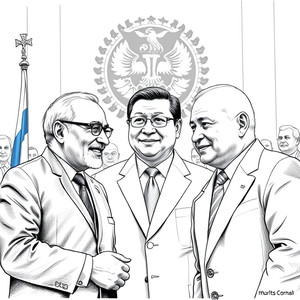
The 16th BRICS Summit highlighted multilateralism and efforts to create a more inclusive global order, particularly for the Global South.
India and China reached a historic agreement on their border dispute, marking a diplomatic thaw and opening avenues for economic cooperation.
Russia’s role in fostering India-China cooperation strengthens BRICS as a counterbalance to Western influence and enhances regional stability
The 16th BRICS Summit, hosted by Russia, spanned three days and marked the first official participation of the new BRICS members. On October 24th, the BRICS Plus and outreach session was held, inviting several countries with friendly ties to BRICS. The summit’s theme was “Strengthening Multilateralism for Just Global Development and Security,” while the BRICS Plus outreach session focused on “BRICS in the Global South.” This summit was significant, occurring during a period of global dissatisfaction with the existing world order, which has been unable to resolve major geopolitical challenges.

On the second day of the summit, a declaration was made. The BRICS countries called for substantial changes in the political and economic institutions that govern the world. Politically, they advocated for greater multilateralism and a multipolar world, and economically, they sought a more inclusive and transparent system, free from dominance by any single power. Special attention was given to Asia, the Global South, and particularly African nations. Key topics included climate change and the principle of “common but differentiated responsibilities” in addressing global challenges. The summit highlighted the shared aspiration of BRICS members to create a fairer and more inclusive world, offering a framework for solving global issues.
India and China at BRICS
The attendance of India, China, and Russia at this year’s BRICS Summit was the main event, particularly the kind welcome that President Putin gave to the Chinese and Indian leaders. These three leaders were the focus of the summit, and the first day’s gala supper brought attention to their strong relationships. Long-standing disagreements between China and India, especially over border matters, have prevented complete cooperation, despite the fact that international experts have long highlighted the potential of Russia, India, and China when working together.

This summit was crucial because India and China were able to settle their disputes over the Line of Actual Control, restoring the situation to its pre-2020 status. This agreement was finalized just a day before the BRICS Summit. Additionally, the leaders of India and China met for the first time in five years during the summit, marking a major diplomatic breakthrough. The temporary thaw in relations between India and China is believed to have been orchestrated, in part, by President Putin. The timing of the agreement, just before the BRICS Summit and followed by the leaders’ first meeting in five years, is unlikely to be coincidental. President Putin’s involvement indicates his desire for internal stability within BRICS and his intention to challenge Western-led hegemony through the BRICS alliance.
Russia at BRICS

Following the Ukraine war, Russia’s relations with the West deteriorated, leading it to expand its influence in Asia. In this context, China and India are vital due to their economic size and their shared importance as democracies. Together, these two countries represent 40% of the world’s population and contribute significantly to the global economy. Russia recognizes that maintaining strong ties with both China and India will prevent its isolation. Additionally, Russia aims to foster cooperation between India and China, unlocking the economic potential between the two nations. This strategy seeks to create greater stability among the three countries and strengthen BRICS as a counterweight to Western dominance.
The Importance of India-China Relations
More than Russia, India and China need to come together. This was reflected in India’s Economic Survey, which acknowledged that the Indian market requires Chinese investment. The Indian government is considering allowing substantial Chinese investment, especially given China’s expertise in electrical manufacturing. If India aims to lead this sector, it will need to welcome Chinese investments.
Similarly, India’s automotive sector has evolved through its partnership with Suzuki of Japan, revolutionizing the industry. A similar expectation exists for Indian manufacturing, which could benefit from increased cooperation. However, India’s dependence on China remains high, as it has not yet established multiple supply chains, much like the rest of the world.
Although disengaging from China could become more politicized, maintaining open communication between the two nations could reduce future tensions. The Indian government has made it clear that India-China relations will be based on equality and stability at the border. Now that a border agreement has been reached, both countries are poised to cooperate, benefiting India. However, the Indian government must carefully balance this by protecting its economic interests and preventing an overwhelming influx of Chinese products into the Indian market.
It is crucial to understand why China has reconsidered and reversed its traditionally adversarial stance toward India. President Xi had long maintained a confrontational policy toward India, both over border disputes and in foreign policy. However, Xi’s willingness to now cooperate with India suggests that his earlier policy has not yielded the desired outcomes. This shift has enabled India to come closer to China. India’s foreign policy, as seen in its Act East policy and its stance on the South China Sea, has been assertive but also recognizes the economic benefits of cooperation. The Chinese economy has been stagnating, and China is seeking developing markets for investment. India, as a growing economy, is critical for Chinese investment, and this could help stabilize the relationship. China likely realizes the importance of investing in India to diversify its economy. Maintaining open communication between the two countries will be crucial for future cooperation.
References:
1)https://indianexpress.com/article/opinion/columns/brics-summit-at-kazan-the-takeaways-for-india-russia-and-china-9636422/
Aayush Pal is a freelance writer on contemporary geopolitical developments. The views expressed in his work are entirely his own.
